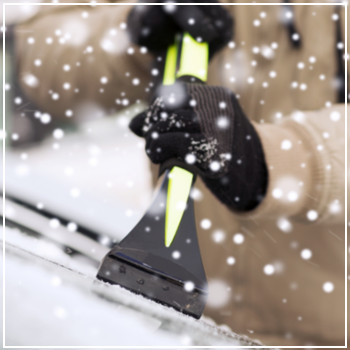 Driving in snow and ice can be dangerous, but leaving your car parked all winter isn’t much better. Cold weather can cause damage to your vehicle by making parts brittle and fluids thicker, which increases stress on the system. What should you do to protect your car?
Driving in snow and ice can be dangerous, but leaving your car parked all winter isn’t much better. Cold weather can cause damage to your vehicle by making parts brittle and fluids thicker, which increases stress on the system. What should you do to protect your car?
Tires
When temperatures drop below 44°F, your all-season tires begin to harden, reducing their grip on icy or snowy roads. This loss of traction can make it harder to control your vehicle. Additionally, tire pressure decreases as it gets colder—each 10°F drop can lower the pressure by one pound per square inch (PSI). If not monitored, under-inflated tires can wear unevenly, increase the risk of blowouts, and reduce handling, especially on slippery surfaces.
Fluids
Cold weather makes engine oil, transmission fluid, and antifreeze thicker, which can slow their flow through the engine. To avoid this, let your car warm up for 10 to 15 minutes before driving. Otherwise, the thickened fluids may strain internal components and lead to leaks or performance issues later. At the start of winter, check all fluid levels and top them off if needed. If any fluid looks dirty or cloudy, consider replacing it. Using a thinner oil grade or adding an engine block heater can also help with cold starts.
Don’t forget about coolant. Water-based mixtures can freeze and expand, potentially cracking internal parts. Always use pure antifreeze during the winter months to protect your engine from damage.
Engine
Many people like to turn on the heater right after starting the car, but doing so too soon can take away energy from the engine. Wait at least 20 minutes after starting before using the heater. This allows the engine to warm up properly, improving fuel efficiency and preventing unnecessary strain on the system.
Windshields and Wipers
Extreme cold can cause glass to crack if you pour hot water on it, which is why that method is not recommended. Similarly, using the defroster at high settings immediately can also damage the windshield. If you don't want to use an ice scraper, try an alcohol-based de-icer instead. Cold weather can also freeze wiper blades to the glass, potentially damaging both the blades and the windshield. Tilt the wipers away from the glass or remove them if an ice storm hits unexpectedly.
Battery
Car batteries don’t perform well in freezing temperatures. Most batteries work best between 30°F and 90°F, and older batteries are more likely to fail in the cold. Before winter begins, have your battery tested. If it’s weak or struggling to hold a charge, replace it. Storing your car in a garage or a climate-controlled space can help maintain battery health by protecting it from extreme temperature swings.
Leaking
Thickened fluids can cause leaks, but another issue to watch for is condensation. When a car moves between warm and cold environments, moisture builds up inside. This moisture can freeze, causing ice buildup in systems like the power steering, brakes, and transmission. Ice blocks can lead to leaks or malfunctions. Flushing old fluids at the start of the season helps prevent these issues.
Corrosion
Even when parked, your car is exposed to road salt and debris, which can cause rust and corrosion. Over time, this can weaken structural components, damage the undercarriage, and affect braking performance. To prevent this, have your car rustproofed at the start of winter. Regularly washing off salt and dirt, especially from the undercarriage, is also important.
Whether you need your fluids topped off, your battery replaced, or your car rustproofed, DaSilva’s Auto Body can help prepare your vehicle for the winter season. Contact our Naugatuck location today to schedule an appointment and ensure your car is ready for whatever the cold brings.
Aluminum Electric Wheelchair,Electric Wheelchair Pricing,An Electric Wheelchair,Aluminum Wheelchairs
Ningbo Baichen Medical Devices CO.,ltd , https://www.bcscooter.com
![<?echo $_SERVER['SERVER_NAME'];?>](/template/twentyseventeen/skin/images/header.jpg)